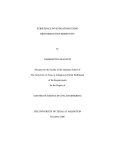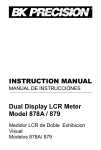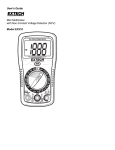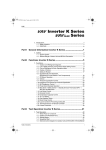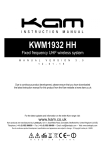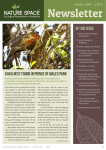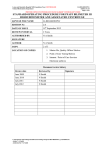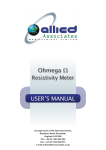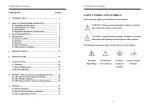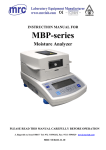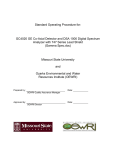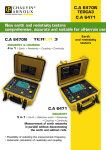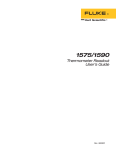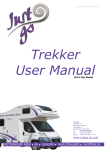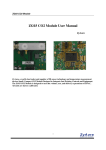Download GEOPULSE TIGRE RESISTIVITY METER USER`S MANUAL
Transcript
CAMPUS IN TERNATIONAL PRODUCTS LTD GEOPULSE TIGRE RESISTIVITY METER USER’S MANUAL CAMPUS INTERNATIONAL PRODUCTS LTD CONCEPT HOUSE 8, THE TOWNSEND CENTRE BLACKBURN ROAD DUNSTABLE. BEDFORDSHIRE ENGLAND LU5 5BQ TEL: (44) 1 582 606 999 Campus International Products Ltd. Geopulse Tigre FAX: (44) 1 582 606 991 WARRANTY 1. Campus International Products Ltd products are fully tested in our workshop both during construction and after completion and are dispatched in full working condition. Instruments are guaranteed for 12 months from the date of dispatch from the factory, liability being limited in accordance with clause 9 of the General Conditions for the Supply of Plant and Machinery for Export (UN Economic Commission for Europe, Geneva, 1953). 2. When unpacking, please check the contents against the packing list and inspect for damage and malfunction of any kind. In the case of any defect, inform the carrier immediately and report in full to Campus or their local agent the extent of the damage. Await their reply before taking any further action, except in exceptional circumstances. 3. Should a fault be identified that cannot be remedied on site within the guaranteed period, consult with Campus. Normal procedure will be to return the unit (or complete system if necessary), carriage paid, to Campus for inspection and repair or replacement free of charge, provided the fault has not been due to misuse. 4. As far as possible use original case and packaging material for return of the instrument. Equipment is on occasions subject to very rough handling during transit and Campus cannot be liable for damage due to faulty packing. 5. It is the responsibility of the customer to notify Campus or their agent of defect or damage to the equipment within a reasonable time of receipt. We would recommend that any defect or omission should be notified verbally but with written confirmation no more than 72 hours after receipt of the product. 6. Campus International Products Ltd will take all necessary steps to rectify any failure, which is deemed the responsibility of the manufacturer, as quickly as possible. 7. No liability against consequential loss can be excepted under any conditions. Thank you for purchasing the Geopulse Tigre Resistivity Meter. Campus International Products Ltd. Service and Sales Centre Campus International Products Ltd. Concept House 8, The Townsend Centre Blackburn Road Dunstable Bedfordshire England Tel: +44 (0) 1582 606 999 Fax: +44 (0) 1582 606 991 Attn: Matthew Stares Attn: David Smale Attn: Norman Bell (Technical enquiries) (Geophysical enquiries) (Sales enquiries) Campus International Products Ltd. Geopulse Tigre Campus International Products Ltd. Copyright © 1999 Campus International Products Ltd. All rights reserved including the right of reproduction in whole or in part in any form. Published by Campus International Products Ltd. Concept House 8, The Townsend Centre Balckburn Road Dunstable. Bedfordshire England LU5 5BQ Printed in Great Britain Campus, Geopulse and Tigre are registered trademarks of Campus International Products Ltd. Geopulse Tigre Campus International Products Ltd. Geopulse Tigre INTRODUCTION THE CAMPUS TIGRE RESISTIVITY METER The CAMPUS TIGRE is a high quality earth resistance meter capable of accurate measurements over a wide range of conditions. To enhance its capabilities it is provided with an optional computer link enabling control to be transferred to a PC notebook computer. The TIGRE can also incorporate banks of relays, which will allow computer-controlled sounding and imaging. Campus International Products Ltd. Geopulse Tigre CONTENTS WARRANTY 2 INTRODUCTION 4 CONTENTS 5-6 1. GENERAL DESCRIPTION OF THE TIGRE RESISTIVITY SYSTEM 1.1 1.2 1.3 1.4 2. The TIGRE Computer Control The Survey Systems 1.3.1 Profile and Mapping 1.3.2 Offset Wenner Sounding 1.3.3 Electrical Imaging 1.3.4 MRT Surveys Power Booster THE TIGRE INSTRUMENT 2.1 2.2 2.3 2.4 2.5 7 7 7 7 8 8 8 8 8 9 Construction The Controls and Connections 9 10 2.2.1 ON – Off Switch 2.2.2 Go button 2.2.3 mA (current) button 2.2.4 MODE button 2.2.5 Number of Cycles 2.2.6 Sample Time 2.2.7 Alpha-Numeric Display 2.2.8 External Power Supply 2.2.9 Computer Control 2.2.10 Manual Control 2.2.11 External System Connection 10 10 11 11 11 11 12 12 13 13 13 Making Measurements The Signal Power Supply 14 16 17 Campus International Products Ltd. 2.6 3. Battery Charger Geopulse Tigre 17 ELECTRICAL IMAGING WITH IMAGER CABLES 18 3.1 3.2 3.3 3.4 3.5 18 18 18 19 3.6 3.7 3.8 3.9 Introduction The system Choice of Cable Laying Out the Cables and Electrodes Designing and Carrying Out a Survey with TIGREPRM and TIGRECOM Control Software Instrument Parameters Survey Modes Problems Presentation of Data 20 23 24 26 26 4. TIGRE SPECIFICATIONS 27 5. EC CERTIFICATES OF CONFORMITY 28 - 29 Campus International Products Ltd. Geopulse Tigre 1. GENERAL DESCRIPTION OF THE SYSTEM 1.1. THE TIGRE The TIGRE is a high quality earth resistance meter capable of accurate measurement over a wide range of conditions. It has a maximum power output of 18 watts, manual selection of current in steps up to 100mA, a choice of sample time / signal length averaged and three frequency settings. The receiver incorporates automatic gain steps, which provide a range of measurements from 0.00001Ω το 2000kΩ. The instrument is powered by a large capacity rechargeable battery providing several days of use without recharging in average terrain conditions. The TIGRE is housed in an impact-0resistant steel case. 1.2. COMPUTER CONTROL Though the TIGRE can be used as a stand-alone system to carry out electrical profiling or vertical soundings with any type of electrode array, it has been designed with a view to integrating it with a number of resistivity survey systems developed by Campus International Products. To make this possible, control of the instrument is transferred to a portable notebook computer (IBM compatible). The computer automatically switches in the correct electrodes for each particular measurement through a bank of relays housed in the meter. Computer control also has the advantage of making possible a much wider range of instrument parameters than would otherwise be practicable. The square wave reversal periodicity and the current-on to current-off ratio can both be modified in order to optimise measurement quality. All data are logged and are immediately available for interpretation. Self-potential readings can also be monitored and there are a number of check routines. Basic software for operating the computer is provided on a 3.5" floppy disc supplied with the manual. 1.3. THE SURVEY SYSTEM The construction of the TIGRE, with its own switching capabilities makes it easy to operate with a variety of survey systems. These can only be operated when the instrument is functioning under computer control. Campus International Products Ltd. Geopulse Tigre Profiling and Mapping Automatic profiling can be carried out with any 2, 3 or 4 electrode array. Campus International Products Ltd. can supply a special half-meter square array (the SQUARE-4), for use where only shallow penetration is required. With the SQUARE-4 and other electrode arrays, data logging is automatic. Offset Wenner Sounding Electronically controlled switching in the module enables high quality soundings to be measured automatically using the patent OFFSET SOUNDING SYSTEM. Offset Wenner, Schlumberger or Wenner soundings may be easily carried out. A laptop computer operates the program and processes the data. Electrical Imaging The TIGRE can also be used with multicore imaging cables with any electrode spacing Normal operational spacings are either 1m, 2,m 5m or 10m. The software carries out repeated sweeps along with a constant separation 2-,3- or 4-electrode array, increasing the spacing at each sweep, thus producing an electrical cross section (pseudosection) or image of the ground that can be further refined by processing. This is particularly applicable to environmental and engineering site investigations and for archaeological studies. Depending on the amount of switching included in the Tigre, from 1 to 8 cables can be connected directly to the instrument. MRT Surveys A direct interface with the Microprocessor-controlled Resistivity Traversing (MRT) system (a patented smart electrode survey system) is also possible with the TIGRE. 1.4. POWER BOOSTER Starting in July 1999 the power booster is fitted as standard to all Tigre systems providing current capacity to 200mA. Campus International Products Ltd. Geopulse Tigre 2. THE GEOPULSE TIGRE 2.1 CONSTRUCTION Figure One – The Geopulse Tigre Front Panel The TIGRE is housed in an impact-resistant steel case with removable lid and is fully waterresistant. The various units are mounted below the front panel and the whole instrument can be removed from the case by unscrewing the plate. The transmitter/receiver controls and display occupy the left hand half of the panel, while client-selected cable sockets are located on the right hand half of the panel. The design of the TIGRE allows for the construction of a basic resistivity meter or a multi electrode imaging system, up to 256 electrodes. The design concept also allows for Campus International Products Ltd. Geopulse Tigre straightforward upgrade from 32 electrodes to 256, in modular steps, thus allowing the system to expand in line with customer requirements. 2.2 THE CONTROLS AND CONNECTORS Figure Two TIGRE Lower Left-Hand front panel showing Operation Buttons All the external controls, together with the liquid crystal display are situated on the top front panel of the instrument. They are fully waterproof. The controls are shown in Figure 2 and are described below. In addition to the “ON” switch and the “GO” or initiate measurement button, there are three other buttons marked mA, MODE and ~ See Figure 3. ON – OFF Select to switch the instrument for operation or to switch the instrument off. GO Press this button to initiate / Start measuring with the previously set parameters. Campus International Products Ltd. Geopulse Tigre mA (Current) The button marked mA is used to select the desired current in milli-amps. The current is increased each time the button is pressed in the following steps: 0.5 1 2 5 10 20 50 100 The current value selected is indicated on the display. MODE The button marked MODE selects the type of measurement. The display will indicate the following sequence of options as appropriate. Resistance Self potential Battery Volts NUMBER OF CYCLES ~ The button marked selects the number of readings to be averaged. This can be from 1 to 16. Details of how the signal is processed to obtain a single measurement of ground resistance are given in Section 2.4. of this manual. SAMPLE TIME If the MODE and mA buttons are pressed simultaneously the sample time (or signal length) can be changed as shown below: Campus International Products Ltd. Geopulse Tigre 0.8s 1.2s 2.4s APLHA-NUMERIC DISPLAY The 80-character (4x20) liquid crystal display indicates the parameters selected and the measurement details as the survey progresses. See Figure Three. The display can be backlit by pressing MODE and ~ simultaneously. The light automatically switches of after one minute if no activity is sensed during this time. Figure Three TIGRE Display and Electrode Terminals EXTERNAL POWER SUPPLY An external 12V-power supply may be connected through the socket situated immediately below the RS232 socket. See Figure Five. A connecting lead is supplied for this purpose. It is important to remember the correct polarity when connecting to an external supply. WARNING: DO NOT CONNECT TO A CAR BATTERY WHILE IT IS BEING CHARGED! Campus International Products Ltd. Geopulse Tigre COMPUTER CONTROL To operate under computer control, connect any IBM compatible notebook computer to the resistivity meter via the RS232 port. See Figure Five. A connecting lead is supplied. The correct connections to the instrument are shown below (Figure Four). 4 1 3 2 Ground 1 Rx Tx Figure Four RS232-port connections MANUAL CONTROL The red and black coloured current and potential terminals marked P1, P2, C1, C2, are situated on the front panel – See Figure Three. Single core cables may be connected to these terminals for measuring earth resistance. EXTERNAL SYSTEM CONNECTION The connector marked MOD allows connection of the Campus Square-4 or other profilling systems. See Figure Five. Figure Five TIGRE Display and Electrode Terminals Campus International Products Ltd. Geopulse Tigre 2.3 MAKING MEASUREMENTS 1. Check that the instrument is correctly connected to the current and potential cables. See Figure Seven. When the manual Offset Wenner system is used, the current and potential terminals are connected to the Offset Wenner system switchbox. The Offset cables may also be connected to the TIGRE if the instrument has been manufactured with the correct MOD port and in this case no module is required. See separate manual supplied with the Offset Wenner Sounding System. 2. Switch on. Display shows MODE: Resistance 1=0.5mA Cycles=2 3. Check battery volts. If the battery is below the operating voltage the display will read BATTERY LOW Reduce Current 4. If above 50°C or below 0°C the display will read INT TEMP OVER 50degC Or UNDER 0degC Take steps to bring the temperature within the operating range. Check the temperature regularly since in tropical sunshine it may well rise above the danger level. Note that although the instrument will operate below 0°C, it is not designed for work under exceptionally low temperature conditions. 5. Check the SP voltage. Use the MODE switch to put the instrument into the Self Potential mode. Make a few measurements to see how it is varying by pressing the GO switch and noting the results obtained. The amplitude and rate of change of the SP will affect the readings at low resistance values and determine the instrument settings required to optimise accuracy. 6. Select the current setting using the mA button. Normally start at 2mA and keep as low as possible, consistent with obtaining good repetition. If ground conditions are such that the instrument cannot deliver the required current or there is an open circuit it will read CURRENT ERROR Check Electrodes Campus International Products Ltd. Geopulse Tigre Decrease the current and/or water the electrodes to improve ground contact. Experience shows that when operating multicore cable systems, accurate measurements are obtained with contact resistances below 2000Ω. ~ 7. Select the number of readings to be averaged using the button. This will depend to a great extent on ground noise. Start with 4 readings and increase or decrease depending on the consistency of the readings obtained. 8. Select Resistance and press the GO button. The display will initially indicate the voltage gain being used in the measurement. …Setting Gain G=5 I=2mA n-3 indicates the amplifier gain setting. These are x5, x0.5, x0.05 and x0.005. In a noisy environment, high and varying SP values may cause the amplifier to saturate during the averaging. The display will show GAIN ERROR Change Current In this case, reduce the current to bring the signal within the operating range. The display will then indicate the successive averages of the resistance, bleeping each time during the process. At the standard setting the instrument takes 2.1s to complete a set of 4 readings. A three-figure resistance will show with the decimal point approximately placed, followed by Ω or mΩ. If the potential and current connections have been incorrectly connected a negative sign will precede the digits. This can also be due to ground conditions. 9. If the switching circuits operated by the current or mode buttons on the top panel are faulty the display will read MODE ERROR. 2.4 THE SIGNAL Campus International Products Ltd. Geopulse Tigre The transmitter uses reversed DC to produce the signal shown in Figure Six (a). An internal three-position switch on the microprocessor board provides three sampling rates. These are: - Repetition time 1. 1.0s on 0.4s off, 1.0s on, 0.4s off. 2.8sec. 2. 1.5s on 0.6s off 1.5s on 0.6s off 4.2sec. 3. 3.0s on 1.2s off 3.0s on 1.2s off 8.4sec. The standard setting with which the instrument leaves our laboratories is the second setting above. mA (a) Volts (b) A B C Seconds Figure Six. The TIGRE SIGNAL (a) Transmitted signal (variable Periodicity), (b) Received signal. Here the attenuated and modified signal is superimposed on slowly varying earth currents. It is sampled over times A, B and C. The on period is sampled for only the last 4/5 of the on time e.g. 0.6s in 0.75s. An example of the received signal in the presence of electrical ground noise is shown in Figure 3b. This figure also illustrates the processing technique used to extract a value of the required potential difference from the received signal, here shown superimposed on a slowly varying earth current. The signal is digitally sampled over times A, B and C and the amplitude calculated as (Va+Vc–2Vb)/4). The on/off ratio is 2.5:1 and the sample/unsampled ratio during any on period is 4:1. This is to allow any coupling and IP affects to die away before sampling takes place. Campus International Products Ltd. Geopulse Tigre When a number of cycles are averaged the microprocessor calculates the potential difference from successive sets of three “on” periods, ABC, BCD, CDE, giving values (Va+Vc–2Vb)/4, (Vb+Vd–2Vc)/4, etc. When conditions are adverse, e.g. a low signal/ground noise ratio, apparent as a lack of consistency in the readings, use higher current settings that do not cause a “GAIN ERROR” and average over 16 cycles. Gain errors are usually due to sudden increases in ground noise saturating the system. If the area is generally very noisy it may be necessary to operate at the longest cycling time. In extreme conditions, i.e. measuring very low resistances against a background of large amplitude and varying SP, highly inconsistent readings may be obtained. In this case it is necessary to put the instrument into the computer command mode and vary the sampling parameters until satisfactory results are obtained. See Section 3. 2.5 POWER SUPPLY The Tigre uses sealed lead-acid batteries (7 Amph at 12v). Under average working conditions (e.g. 10 offset soundings per day at 5mA) recharging every 2 working days would be safe practice. Electrical imaging uses more drain on the batteries and so the instrument should be charged overnight during survey operations. Should it be necessary to be away from a mains power source for more than a few days the instrument can be operated using an external supply. A 12V-car battery which can recharged from a vehicle can be used in an emergency. A separate lead and plug is supplied which is plugged into the battery charger socket and the lead connected to the battery. Be sure to check the polarity before connecting to the instrument. WARNING: Do not run the vehicle engine while the instrument is connected to the battery as transients from the alternator can damage the transmitter circuitry. 2.6 BATTERY CHARGER This operates from 240v or 115vac. The maximum current output is such that batteries can be left on indefinitely without suffering and damage. Charging time from full discharge is 16 hours. NOTE: IF THE METER IS OPERATED WHILE THE BATTERY IS BEING CHARGED, THE CHARGER IS AUTOMATICALLY DISCONNECTED. Campus International Products Ltd. Geopulse Tigre 3 ELECTRICAL IMAGING WITH THE TIGRE 3.1 INTRODUCTION The campus TIGRE contains an optional switching module, which enables automatic addressing of multi-electrode survey systems. The minimum configuration allows for the switching of up to 32 electrodes. Additional onboard modules will allow for 64, 128 and 256 electrodes. Each survey electrode may be addressed and set up as either one of the current electrodes C1 or C2, or one of the potential electrodes, P1 or P2. An electrode may be addressed to take two roles so that, for example, it can act as both C1 and P1. Additionally far electrodes may also be connected directly to the Tigre resistance meter. The system therefore has complete versatility. 3.2 THE SYSTEM The IMAGER cables should be connected to the TIGRE at the sockets marked CABLE 1, CABLE 2 etc. A portable Laptop computer is connected to the RS232 port. The relationships of the electrodes to the relays in the control module are shown in Figure Seven. The following description assumes that standard 32-takeout cables are employed in the surveys. A. A single IMAGER cable. If a single IMAGER cable is being used it should be connected to the left connector on the front panel, socket marked CABLE 1. In this case relays 1 – 32 will correspond to the electrodes 1 – 32 numbered from the connector (See Figure Seven A). B. Two IMAGER cables. When two cables are connected to the control instrument, the electrodes will normally be numbered from one end of the line of 64 electrodes to the other end. In this case relay 32 will correspond to electrode 1 and relay 1 to electrode 32. On the second cable, relay 33 will correspond to electrode 33 and so on to relay 64 which will correspond to electrode 64. Full details are shown in Figure Seven B. C. X IMAGER cables. The versatile construction of the TIGRE presently allows for up to 8 cables to be connected or 256 electrodes. The above configuration applies regardless of the number of cables. 3.3 CHOICE OF CABLE Select a cable with electrode spacing suitable for the problem being studied. If measurements are made with multiples, n, of the unit electrode spacing, a, from n = 1 to n = 8, the depth range covered is approximately from a/3 to 6a although the greatest response will be from the Campus International Products Ltd. Geopulse Tigre depth range a/2 to 4a. For example, a 1 meter spacing would be used to study the range 0.5 to 4m. A. SINGLE CABLE ELECTRODE 1 32 RELAY 1 32 Tigre B. TWO CABLES ELECTRODE 32 1 33 64 RELAY 1 32 33 64 Tigre Figure Seven Electrode connections. 3.4 LAYING OUT THE CABLES AND ELECTRODES The IMAGER cables are set out in a straight line and electrodes connected to every takeout. The electrodes should be inserted into the ground to a depth of no more than 5% of the unit electrode spacing. For small spacing cables special small electrodes are supplied so that the operator is not tempted to plant electrodes to greater depths. Nevertheless the operator should ensure that good ground contact is achieved. In dry conditions each electrode should be withdrawn and a small amount of water added to the hole before replanting the electrode. When all the electrodes have been connected, the system is ready to run the program TIGRECON. Campus International Products Ltd. 3.5 Geopulse Tigre DESIGNING AND CARRYING OUT A SURVEY WITH TIGREPRM AND TIGRECON CONTROL SOFTWARE. The system may be set up to operate routinely with any particular set of electrodes and cables to carry out specific survey measurements. The survey design is stored in a parameter file, which once created can be accessed by the control software whenever needed. However, the parameter file has to be created when the survey is first run. A fast method of setting up parameter files for the measurement of Wenner pseudosections is included as a separate program PRM64_2.EXE. The parameter file should be created before running TIGIMG. Parameter files for other types of survey are best created using EXCEL or other software. Once in the field ready to start measurements, the laptop computer is switched on and the system booted. Insert the disk, type TIGIMG and follow the instructions. After the title screen, the correct serial port (COM1 or COM2) must be selected. The following main menu then appears. **************TIGRECON MAIN MENU************ Please enter option Load/Create parameter file.................1 View parameter file........................2 Edit parameter file........................3 Take/continue resistance measurement.......4 Show resistance measurements...............5 Save resistance measurements...............6 Repeat a measurement.......................7 Check contact resistance...................8 Exit to system.............................9 Select Option 1 OPTION 1 Campus International Products Ltd. Geopulse Tigre When Option 1 is selected the following menu appears. Enter parameter filename (use no spaces) - *.prm Enter the filename of the previously created parameter file. The filename should be no more than 8 characters long. The file extension .PRM is provided by the computer automatically. OPTION 2 Select this option to view the data in the parameter file. The following type of information will be displayed. Test Survey Reading 1 2 3 4 5 6 Current 10 10 10 10 10 10 Cycles Ton Toff P1 P2 C1 C2 2 1.0 0.5 1 2 2 1.0 0.5 2 3 2 1.0 0.5 3 4 2 1.0 0.5 4 5 2 1.0 0.5 5 6 2 1.0 0.5 6 7 Press any key to continue 3 4 5 6 7 8 4 5 6 7 8 9 OPTION 3 Select this option if further editing is required. Screen messages are as described in Option 1. OPTION 4 Select this option to start a survey using the parameters described in the parameter file. The following message appears. File filename.PRM allows 6 different measurements Select option:All measurements.......1 Selected range.........2 Continue survey........3 Campus International Products Ltd. Geopulse Tigre If only a selected range is required the program will ask for: Number of first measurement? Number of last measurement? Sub-option 3 above can be used after a set of resistance measurements has been interrupted (where the user has had to return to the main menu to edit a parameter file for example). The computer then prints a message instructing the operator to SWITCH SWITCH SWITCH SWITCH SWITCH SWITCH ON ON ON ON ON ON METER METER METER METER METER METER The computer then completes a set of resistance measurements displaying the results as they are obtained. OPTION 5 The resistances may be examined using this option. If it is necessary to repeat a measurement, the operator should proceed to Option 7. OPTION 6 Select this option to store data on disk. A filename for data storage has to be supplied. OPTION 7 To repeat a measurement, the number of the measurement as it appears in the parameter file has to be entered. Campus International Products Ltd. Geopulse Tigre OPTION 8 The software provides the possibility of estimating electrode contact resistances. This is done by first measuring resistances at 3 electrodes at which good ground contact is certain. By default, the TIGRE selects the first (closest) three electrodes on Cable 1. Assuming no cable resistance and negligible ground resistance, a set of simultaneous equations is solved to provide contact resistances at the first three electrodes. All other contact resistances are measured in relation to electrode 1. For this reason, it is important that electrode 1 is correctly connected. Contact resistances will be displayed as they are measured. High contact resistances are generally not a problem if multicore cables are being used, as the TIGRE has a very high input impedance. However, one effect of high electrode contact resistance when multicore cables are used, is an increase in coupling between cores and consequent distortion of the observed waveform. This can be quite severe in laboratory experiments where the measuring system itself can add to the distortion of the waveform. In field surveys our experience suggests that good data can be recorded if contact resistances are lowered to less than 200Ω. This is done by watering electrodes with saline water, emplacing them in clay or using multiple electrodes. 3.6 INSTRUMENT PARAMETERS The suggested values below have been selected to produce measurements with the minimum of power. The operator can increase the speed of the survey by reducing the current on time to 1 second or less. If this is done it is likely that the current will have to be increased to 1, 2 or 5 mA, depending on the electrode spacing used. If unstable measurements are obtained, the current should be increased. Currents of more than 100 mA should not normally be employed with IMAGER cables. Example settings for 1m, 2m and 5m cables might be as follows: 1m cable Level 1 2 3 4 5 6 7 Current 0.5 1.0 1.0 1.0 1.0 2.0 2.0 Cycles 3 3 3 4 4 4 4 Current 1.0 2.0 2.0 Cycles 3 3 4 2m cable Level 1 2 3 Campus International Products Ltd. Geopulse Tigre 4 5 6 7 5m cable 2.0 2.0 5.0 5.0 4 4 4 4 Level 1 2 3 4 5 6 7 Current 2.0 5.0 5.0 5.0 5.0 10.0 10.0 Cycles 4 4 4 4 4 4 4 In low resistivity conditions the current should be increased further. Check the waveform to make sure that a good voltage signal is being detected. In noisy conditions either the current on time or the number of cycles should be increased. 3.7 SURVEY MODES Traverse There are two survey modes that can be employed. Traverse mode allows the completion of all measurements with n=1 before commencing with the n=2 measurements and so on. With a 25 electrode cable a complete pseudosection measured in traverse mode will comprise the following number of measurements at each level. Level Electrode Spacing Number of measurements 1 2 3 4 5 6 7 a 2a 3a 4a 5a 6a 7a 22 19 16 13 10 7 4 Traverse mode measurements are shown in Figure Eight. Campus International Products Ltd. Station 4 Geopulse Tigre C1 P1 P2 C2 Resistance meter with Control module Station 3 C 1 P 1 P 2 C 2 Laptop computer Station 2 C 1 P 1 P 2 C 2 Station 1 25 electrodes C1 P1 P2 C2 a n=1 n=2 n=3 n=4 n=5 a a l 1 l 2 l 3 l l 4 l l l l l l l l l l l l l l l l l l l l l l l l l l l l l l l l l l l l l l l 1 l l l l l l l l l l l l Figure Eight Principle of electrical imaging with a multicore cable in traverse mode Roll-on Roll-on mode takes measurements for n=1, 2, 3, 4, 5 and 6 for station 1 before continuing in the same way for station 2 (Figure Nine). This type of survey should be used if the survey line is likely to extend to more than 25 electrodes. The operator can stipulate the number of measurements which are made before the cable is moved and the process repeated. There are many ways such a survey can be carried out but the following technique will provide continuous cover at Level 7 quickly and efficiently. 1. The cable is set out and measurements are made in Roll-on mode for 7 stations. The table above shows that this is the maximum number of measurements possible at Level 6 with 25 electrodes deployed. Be sure to record the data before progressing . 2. The cable is disconnected and moved along the line until takeout 1 arrives at electrode 8. The 7 used electrodes are moved to the forward end of the line so that 25 electrodes are again connected. 3. The TIGRECON survey program is continued in Roll-on mode for a further 7 stations. The measured data are appended to the end of the data file created in step 1. 4. The process is repeated until the final cable position is reached. 5. At the end of each roll-on stage a message is displayed. Campus International Products Ltd. Station 3 C1 P1 P2 C1 Station 1 C1 P1 P2 C2 a n=1 n=2 P2 P1 Station 2 a a l 1 l Laptop computer C2 l l l l l 3 n=3 Resistance meter with Control module C2 25 electrodes l l 2 Geopulse Tigre l l l l l l l l l l l l l l l l l l l l l l l l l l l l l l l l l l l 1 l 4 n=4 l l l 5 n=5 l l l l l l l l Figure Nine Principle of electrical imaging in roll-on mode. 3.8 PROBLEMS This version of TIGRECON control software has been tested under a variety of field conditions but inevitably problems will occur when it is used in different environments. It is hoped that these problems will be minor. If you experience problems or have comments on the use of TIGRECON please contact Campus International Products Ltd.. 3.9 PRESENTATION OF DATA The observed data can be plotted as a conventional pseudosection. An approximate depth scale may be provided using the following guide. when n=1 n=2 n=3 n=4 n=5 n=6 depth =a/2 =a = 3a / 2 = 2a = 5a / 2 = 3a Campus International Products Ltd. Geopulse Tigre The pseudosection can be contoured and viewed as an approximate image of the subsurface. An automatic inversion program – RES2DINV – is available and enables coloured images of the ground to be produced automatically. Alternatively it can be modelled using a forward modelling program such as RESIXIP2D also available from Campus. 4 TIGRE SPECIFICATIONS TRANSMITTER Maximum power output: Current range : Square wave repetition: Number of readings averaged: 18W 0.5mA to 100mA 8.4s, 4.2s. 2.8s. 1 to 16. RECEIVER Input voltage range: Input impedance: 0 –180V with auto gain averaging. 22MΩ. Measurement range: Low pass filter 360KΩ – 0.001Ω. Display: Power supply: 80 character alphanumeric liquid crystal Rechargeable sealed lead acid. 7 Amp/h @ 12v GENERAL Weight: Electrode capacity 6kg 32 to 256 (optional) Link to portable IBM compatible PC provides:1. 2. 3. 4. Wide choice of waveform and frequency Choice of sampling interval Display of received waveform Data logging Campus International Products Ltd. Geopulse Tigre CERTIFICATE OF CONFORMITY Product: charger for GEOPULSE TIGRE earth resistance meter Serial No. SN0010 Date of Shipment: JULY 2000 EMC 89/336/EEC Generic EN50081/1 Light Industrial Emissions, EN50082/1 Light Industrial Immunity Tests Applied BSEN 55011 Class B Conducted Emissions BSEN 55011 Class B Radiated Emissions BSEN 61000-4-4 Fast Burst Transients to Level 2 Light Industrial BSEN 61000-4-2 Static Discharge to Level 2 Light Industrial Category 1 PASS Low Voltage Directive 73/23/EEC: N/A below 50V AC. Machinery Directive 98/37/EEC: N/A – no moving parts. We, on behalf of Campus International Products Ltd., confirm the Product described above meets the requirement in all respects. Signed……………………….. Authorised Signatory……………………….. Campus International Products Ltd. Concept House Blackburn Road Dunstable Bedfordshire England LU5 5BQ Tel: +44 (0) 1582 606 999 Fax: +44 (0) 1582 606 991 Campus International Products Ltd. Geopulse Tigre CERTIFICATE OF CONFORMITY Product: GEOPULSE TIGRE earth resistance meter Serial No. SN0010 Date of Shipment: JULY 2000 EMC 89/336/EEC Generic EN50081/1 Light Industrial Emissions, EN50082/1 Light Industrial Immunity Tests Applied BSEN 55011 Class B Radiated Emissions BSEN 61000-4-4 Fast Burst Transients to Level 2 Light Industrial BSEN 61000-4-2 Static Discharge to Level 2 Light Industrial Category 3 PASS BSEN 55011 Class B Conducted Emissions: N/A – battery only Low Voltage Directive 73/23/EEC: N/A below 50V AC. Machinery Directive 98/37/EEC: N/A – no moving parts. We, on behalf of Campus International Products Ltd., confirm the Product described above meets the requirement in all respects. Signed……………………….. Authorised Signatory……………………….. Campus International Products Ltd. Geopulse Tigre Campus International Products Ltd. USER MANUAL COMMENTS SHEET Please note on a copy of this form any suggestions for improvement or any errors found in this manual. Please return the form to:- David Smale Campus International Products Ltd. Concept House Blackburn Road Dunstable Bedfordshire LU5 5BQ ENGLAND Manual Title Rev Number Comments
































